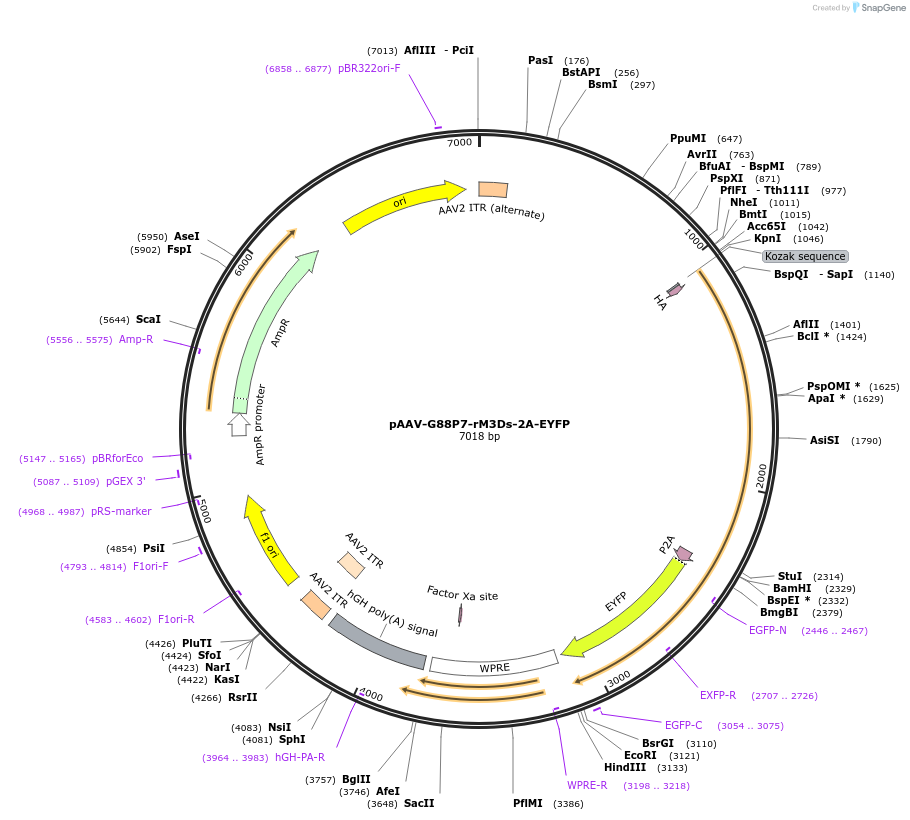pAAV-G88P7-rM3Ds-2A-EYFP
(Plasmid
#213970)
-
PurposeAAV vector with G88P7 promoter in order to induce robust expression of rM3Ds in MSNs
-
Depositing Lab
-
Sequence Information
Ordering
| Item | Catalog # | Description | Quantity | Price (USD) | |
|---|---|---|---|---|---|
| Plasmid | 213970 | Standard format: Plasmid sent in bacteria as agar stab | 1 | $89 | |
Want a viral vector made from this plasmid?
Make a packaging request and we'll get back to you.
Please log in to submit a packaging request.
-
SerotypeSelect serotype for details See details about
-
PricingSelect serotype and quantity $ USD for preparation of µL virus + $32 USD for plasmid.
-
How this works
- Place a request for a quantity of 2 (0.2 mL), 10 (1 mL), 25 (2.5 mL), or 50 (5 mL). Our all-inclusive pricing includes DNA production and QC.
- Addgene will quickly confirm that we can produce a high-quality prep for you.
- Track your request and place an order from within your account. Payment information must be added before we can begin processing your order.
- Receive your prep in 6–9 weeks after the MTA is approved by your organization.
- Learn more about our Packaged on Request Service.
Backbone
-
Vector backbonepAAV-hSyn1-EYFP
-
Vector typeAAV
Growth in Bacteria
-
Bacterial Resistance(s)Ampicillin, 100 μg/mL
-
Growth Temperature37°C
-
Growth Strain(s)NEB Stable
-
Copy numberHigh Copy
Gene/Insert
-
Gene/Insert namerM3Ds
- Promoter G88P7
Cloning Information
- Cloning method Restriction Enzyme
- 5′ cloning site unknown (unknown if destroyed)
- 3′ cloning site unknown (unknown if destroyed)
- 5′ sequencing primer n/a
- (Common Sequencing Primers)
Resource Information
-
Articles Citing this Plasmid
Terms and Licenses
-
Academic/Nonprofit Terms
-
Industry Terms
- Not Available to Industry
Trademarks:
- Zeocin® is an InvivoGen trademark.
These plasmids were created by your colleagues. Please acknowledge the Principal Investigator, cite the article in which the plasmids were described, and include Addgene in the Materials and Methods of your future publications.
-
For your Materials & Methods section:
pAAV-G88P7-rM3Ds-2A-EYFP was a gift from Zhonghua Lu (Addgene plasmid # 213970 ; http://n2t.net/addgene:213970 ; RRID:Addgene_213970) -
For your References section:
Circuit-specific gene therapy reverses core symptoms in a primate Parkinson's disease model. Chen Y, Hong Z, Wang J, Liu K, Liu J, Lin J, Feng S, Zhang T, Shan L, Liu T, Guo P, Lin Y, Li T, Chen Q, Jiang X, Li A, Li X, Li Y, Wilde JJ, Bao J, Dai J, Lu Z. Cell. 2023 Nov 22;186(24):5394-5410.e18. doi: 10.1016/j.cell.2023.10.004. Epub 2023 Nov 2. 10.1016/j.cell.2023.10.004 PubMed 37922901




